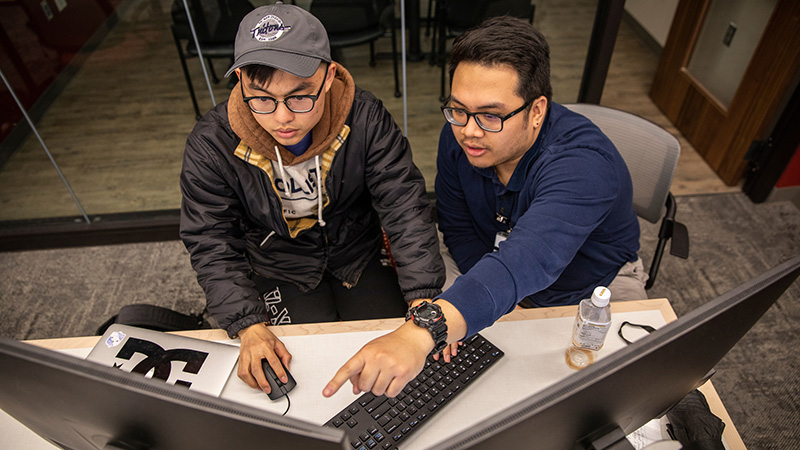Students assist with goal of capturing data for women’s World Cup project
When the 2019 women’s World Cup was approaching earlier this year, Sean Forman ’94 was looking to create the first comprehensive online data collection of women’s soccer statistics for his website, SportsReference LLC. He found a receptive partner in Xavier Escandell, associate professor of anthropology and director of the Data Analysis and Social Inquiry Lab (DASIL).
Housed in the newly built Humanities and Social Studies Center (HSSC), DASIL was established in 2010 to help students and faculty members integrate data analysis into research and classroom work through software training and data-set preparation. Now its impact is reaching beyond the classroom.
Forman and Escandell, along with DASIL student mentors LaAnna Farnelli ’20, Anshul Tambay ’20, and Daniel Cook ’19, as well as Katherine Walden, digital liberal arts specialist, and Jarren Santos ’17, data scientist, crafted a plan to create a database of women’s World Cup data, since the tournament’s inception in 1991.
Escandell relishes the chance to provide students opportunities for learning data software and analysis, but this project went beyond mock exercises or traditional classroom learning, he says.
 Data Scientist Jarren Santos ’17 collaborates with a student to create a database of Women's World Cup data.
Data Scientist Jarren Santos ’17 collaborates with a student to create a database of Women's World Cup data.
“It was a unique experience for students to collaborate on a project with real world implications and tangible deliverables,” he says.
Cook, a double major in mathematics and computer science, used the programming language Python to collect the data from the often unorganized and inconsistent Wikipedia pages. He enjoyed the opportunity to apply his knowledge of Python to solve a real-world data problem. Through his work with DASIL, Cook has skills and tangible experiences that he can articulate and leverage as he enters the professional world.
Walden sees the collaboration as an exemplary model for future projects to incorporate student research in a way that benefits all stakeholders, especially students. As Walden thinks about the professional world of data systems, they don’t always reflect Grinnell’s values, but she believes students are uniquely positioned to bring their applied digital skills and commitment to social responsibility into that field of work. Working to solve this gender disparity in sports data is hopefully just one of many projects like this.
The collaboration between Forman and DASIL students demonstrates the potential of DASIL to facilitate connections across the curriculum and provide meaningful research opportunities with a real-world impact. As the United States women’s soccer team celebrates their record-breaking fourth World Cup victory, their statistics, along with box scores from every women’s World Cup match ever, will be remembered and publicly available on Forman’s internationally recognized website.
Forman provided Grinnell students with an incredible learning experience, but the work of these students, and other projects at DASIL, would not be possible without the donations of alumni and friends.
Wilfried ’70 and Sylvie Prewo, were among those who supported DASIL. Originally from Stuttgart, Germany, Wilfried worked as the CEO of the Hannover Chamber of Industry and Commerce for nearly three decades. In acknowledgment of Wilfried’s empirical research experiences on campus, the Prewos established this important new fund that will directly benefit students by expanding the programmatic impact and reach of DASIL, including increasing student mentor hours. With the generous support of donors, more students can contribute to this kind of work in the future.
— by Ben Binversie ’17